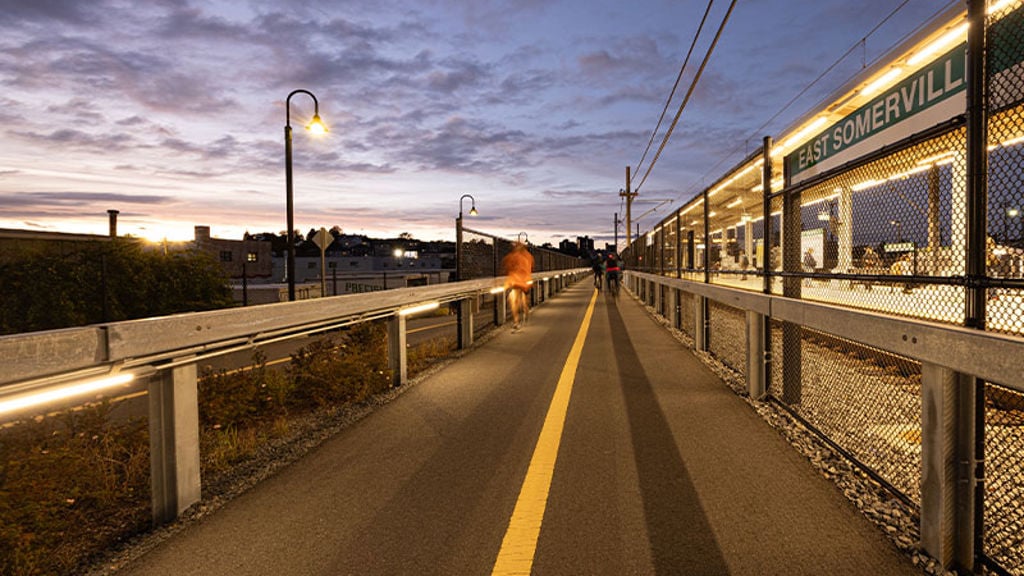Delivering a network of EV rapid charge points for England's Strategic Road Network
Highways England Rapid Electric Vehicle Charge Points Programme

The development of a reliable and accessible charging infrastructure network is essential for the successful roll-out of electric vehicles (EVs) on UK roads. In recent years, public perception has been that EV charge points in the UK are sparsely located and charging times are too slow to make long distance travel viable in an electric vehicle. As a result, both the uptake of electric vehicles and investment into the market have been impacted, leading to black spots in charging provision.
As part of our largest EV infrastructure project to date, Arup managed the delivery of rapid charge points to help Highways England create an ultra-low emission network. The network delivers against the Department for Transport's commitment in its ‘Road Investment Strategy 2015-2020’, ensuring a minimum of 95% of the Strategic Road Network (SRN), which comprises motorways and major A roads, has a rapid charge point every 20 miles.
Arup’s expert team helped to facilitate the implementation of electric vehicle charging points to ensure a more sustainable future in transport.
EV charging criteria
Arup worked closely with Highways England to develop and define essential criteria that newly proposed EV charge point sites must meet, including the ability to reach full charge in 30 minutes, accessibility within a five-minute drive of the SRN and to be available 24/7 to the public. This provided a project framework that ensures the following decisions enable a full network coverage that is always open, secure and accessible for users.
Gaps in the network
Many locations throughout the SRN are challenging and remote. The difficulty in identifying and securing financially viable sites, with adequate electrical power provisions, has created gaps across the network. Using GIS mapping techniques, we have undertaken a route analysis to identify existing charge point locations within a 2.5-mile driving distance of major road networks. This meant we could accurately calculate the coverage provided by these points, how many extra charge points were required and where to locate them.

Procurement model development
Arup developed a bespoke contract to facilitate an open competition. This resulted in two suppliers, Swarco and BPChargemaster, being awarded contracts to install, maintain and operate charge points for a minimum of seven years. The collaboration of our dedicated and responsive team has led to the installation and commissioning of 66 rapid charge points, resulting in a 20% network coverage increase. Surpassing DfT’s original aim, 97.4% of the SRN will now be within 20 miles of a rapid charge point. The provision of these additional rapid EV charging facilities will help alleviate concerns over electric vehicle range restrictions and thus encourage the wider use of EVs for long journeys.
EV Charge points’ usage
Highways England has been provided with access to the EV charge point operator’s online dashboards to monitor the usage of the charge points. This will allow environmental statistics to be measured and quantified across all charge point sites, including CO2 savings, equivalent trees saved and power consumption.

Decarbonising transport
Increased EV usage will not only limit emissions and reduce the carbon and noise footprints of Highways England’s network, but will also improve air quality and lead to improved health benefits for the wider community. Carbon savings will be monitored for a minimum of seven years by Highways England, helping to move the UK towards its commitment to achieving an 80% reduction in greenhouse gas emissions by 2050.
I have had a great experience working collaboratively with Arup’s team of specialist experts for Electric Vehicle Charging Infrastructure. Professional, focused and well informed, as a project team we’ve successfully delivered Rapid Electric Vehicle Charging Points (EVCP) across England ensuring that a EVCP Point is accessible within 20 miles over 95% of the Strategic Road Network (SRN). This essential infrastructure addresses the perceived range anxiety of our customers and supports the growing demand for additional EV charging facilities near the SRN.
Brian Cull
Senior Intelligent Transport Engineer, Highways England
What we delivered
-
Developing a reliable and accessible network of charging infrastructure is essential for the successful adoption of EVs on UK roads.
-
Arup managed the delivery of rapid charge points to help Highways England create an ultra-low emissions network and ensure a more sustainable future in transport.
-
The network delivers against the Department of Transport’s commitment to ensure a minimum of 95% of the road network has a rapid charge point every 20 miles.
Get in touch with our team
Projects
Explore more roads and streets projects

Illuminating a community path for the nighttime safety and enjoyment of pedestrians and cyclists
Somerville Community Path Lighting, USA

County-wide adaptation strategy to protect a critical Bay Area transportation corridor from sea level rise
Marin County Sea Level Rise Adaptation Study, USA

California’s first long-span cable-stayed bridge
Long Beach International Gateway Bridge, USA

Planning an electric bus corridor that links communities across California’s Central Valley
Kings/Tulare Cross Valley Bus Corridor Plan, USA
Get in touch with us
If you'd like to speak to one of our roads and streets experts about any of the issues raised on this page or a potential collaboration then please get in touch by completing the form.

